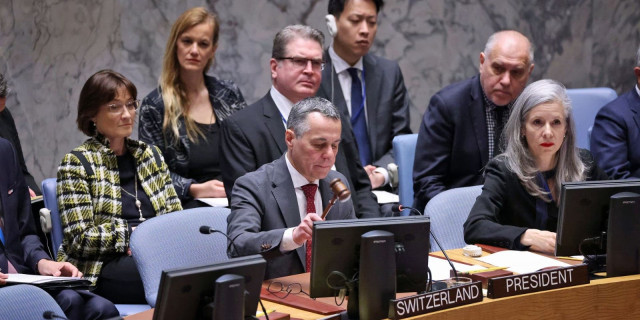Political rift grows in Switzerland over arms re-export proposal to Ukraine
Draft says exports to third countries in conflict must comply with international law, especially self-defense rights

A recent draft from the Swiss House of Representatives’ Security Policy Committee has reignited the debate over the re-export of Swiss war material, especially regarding support for Ukraine.
The proposal suggests that recipient states of Swiss armaments should be allowed to transfer these weapons to third countries, such as Ukraine, after a five-year period.
However, this suggestion has not garnered unanimous support, leading to a divide among political parties.
The draft emphasizes that any transfer to a third country involved in an armed conflict must adhere to international law, particularly the right to self-defense.
Additionally, it outlines the conditions under which previously issued non-re-export declarations can be revoked to facilitate potential transfers to Ukraine.
While parties such as the Centre Party, the Radical-Liberal Party, and the Liberal Green Party view the draft as a reasonable compromise that aligns with Switzerland’s policy of neutrality, other factions express concern.
The Swiss People’s Party (SVP) opposes the bill entirely, advocating for a more liberal approach to the re-export of armaments.
The Greens also reject the proposal, while the Social Democratic Party supports its direction but seeks additional restrictions.
Switzerland has historically maintained strict regulations on the export of war materiel.
The Swiss War Materiel Act prohibits the export of Swiss arms to nations engaged in civil wars or armed conflicts with other countries.
This position is deeply rooted in Switzerland's commitment to neutrality, humanitarian aid, and international law, as reiterated by the Swiss government.
Over the past year, pressure has mounted from other nations, including Germany, Spain, and Denmark, urging Switzerland to relax its re-export ban to support Ukraine against Russian aggression.
However, the Swiss government has consistently rebuffed these requests, reaffirming its commitment to neutrality.
Recent discussions in the Swiss parliament led to a decision to uphold the ban on exporting Swiss armaments to conflict zones.
The government clarified that its stance is not one of indifference toward the ongoing conflict, particularly concerning Russia’s actions against Ukraine.
As part of its response to the war, Switzerland has imposed sanctions on Russia, including freezing approximately CHF 7.5 billion ($8 billion) in assets belonging to oligarchs.
The division among Swiss political parties reflects the complex interplay between national values and international obligations.
Supporters of the re-export bill argue that Switzerland should enhance its support for Ukraine and contribute to European security.
In contrast, opponents, including the Greens and some conservatives, fear that allowing re-exports could undermine Switzerland’s long-standing neutrality and align it too closely with NATO.
In a notable turn of events earlier this year, the Swiss Council of States approved a measure allowing arms re-export to Ukraine, despite opposition claims that such actions could contradict Switzerland’s neutrality.
This decision permits the re-export of Swiss-made armaments under specific conditions, including assurances that the receiving countries respect human rights and do not target civilians with their weapons.
As debates continue, the Swiss government is expected to monitor discussions closely, as the outcome will likely have significant implications for Switzerland's role in international conflicts and its stance on neutrality in the face of geopolitical tensions.



















COMMENTS
Comments are moderated and generally will be posted if they are on-topic and not abusive.
For more information, please see our Comments FAQ